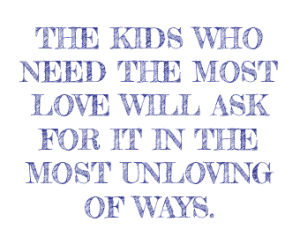4 Tips for Managing Difficult Behaviors in Children
As SLPs, we have all dealt with our share of difficult behavior. I’ve certainly found myself at a loss for how to approach a client that has trouble with focus, motivation, or simply keeping “in line.” After all, we work with children, so this should be expected to a certain degree. However, challenging behaviors can get in the way of our work, and we must do everything we can to avoid them. When they do occur, we must be prepared with reliable strategies to minimize their negative impact on the session at hand, and ultimately, on our entire therapeutic interaction with that client. The four strategies described below will provide you with a plan for managing difficult child behaviors as they arise, and getting you back on track with your therapy.
Take Initial Rapport Very Seriously
 Whenever I get a new case, I make sure to ask the client’s parent three core questions:
Whenever I get a new case, I make sure to ask the client’s parent three core questions:
- How does your child relate to new people, especially new adults?
- How well can your child sustain his attention on a task?
- How does he react to frustration?
Directly asking whether I should expect any “challenging behaviors” can seem like an affront to parents, but the answers to these questions give me a good sense of a child’s behavior in school and other learning situations. If a client’s parent suggests that her child takes some time to warm to new adults, may have trouble sustaining their attention to task, or gets overly emotional or withdrawn when frustrated, this is a sign that I should take extra time to establish rapport. Remember that rapport establishment is a therapist’s and child’s mutual first impression. It is crucial to take extra care establishing rapport with a client that you suspect may be more behaviorally challenging.
Focusing on rapport initially will go a long way toward reducing the frequency of challenging behaviors during our therapy experience.
Ignore and Distract
 Inevitably, challenging behaviors do arise. My cardinal rule when dealing with a difficult or disruptive outburst is simply to “not get into it with the child.” In other words, don’t take the outburst or sudden onset of a difficult behavior in any way personally, or too seriously, and never escalate it. Taking outbursts personally could poison the therapeutic relationship, and escalating them only gratifies the child’s impetus to use outbursts inappropriately — to vent frustration or avoid a difficult task. Of course we want to be sensitive to a child’s frustrations with improving speech — after all, this is often a very tall order! But we don’t want the child to feel rewarded by the outburst or challenging behavior. Instead, ignore the behavior and distract the child with, for example, a reminder of the number of items left before a fun break.
Inevitably, challenging behaviors do arise. My cardinal rule when dealing with a difficult or disruptive outburst is simply to “not get into it with the child.” In other words, don’t take the outburst or sudden onset of a difficult behavior in any way personally, or too seriously, and never escalate it. Taking outbursts personally could poison the therapeutic relationship, and escalating them only gratifies the child’s impetus to use outbursts inappropriately — to vent frustration or avoid a difficult task. Of course we want to be sensitive to a child’s frustrations with improving speech — after all, this is often a very tall order! But we don’t want the child to feel rewarded by the outburst or challenging behavior. Instead, ignore the behavior and distract the child with, for example, a reminder of the number of items left before a fun break.
Only five more words till we can play a quick game!
Also try an on-the-spot modification of the task at hand. For example you, the therapist, could do the next few items and have the child judge for accuracy, or perhaps record the child’s productions and listen to them together. Either way, it’s important that we don’t interrupt our work for a challenging outburst. We should ignore the outburst itself, distract the client by acknowledging and validating their frustration, and then make a slight modification to the activity at hand or reassure him that a break is on the horizon.
Use Positive Reinforcement and Praise
 This can be a tricky one for therapists because frequent outbursts are indeed frustrating. It may be instinct to punish these outbursts, even with a seemingly innocent comment like,
This can be a tricky one for therapists because frequent outbursts are indeed frustrating. It may be instinct to punish these outbursts, even with a seemingly innocent comment like,
“we can’t do our game until we finish these five words,” or, “I am going to have to tell your mom that you’ve been rude to me today.”
But I much prefer, from the above examples,
“we’re almost there. You’re doing a great job. Five more and we can play or game,” or “I really want to be able to tell your mom you did a great job in speech today.”
I admit that I have resorted to the first, more “punishing” responses, but this doesn’t tend to help. Rather it detracted from my overall mission to improve the client’s speech. But we also don’t want to coddle our clients. Our high expectations and insistence on their best work are what really help them. The evidence in child development literature for positive reinforcement, rather than punitive or negative reinforcement, is strong and I think you will see a big difference in how your clients respond.
Similarly, don’t be stingy with praise. It’s obvious to praise exceptional behavior or a learning breakthrough, but a child who has successfully managed an outburst, or a child who struggles to stay attentive should be praised for “little” victories. And we should be quick to heap them on.
Be Consistent with Rules and Expectations
It can be very confusing for a client to deal with shifting rules or expectations. Set your rules and disclose them to your client in a friendly, non-threatening manner during the rapport establishment phase of therapy — and stick to them! If your rule is “you have to finish a set of 20 stimulus items before playing a quick game,” then make sure you finish all 20. Don’t do fewer than 20 or the client may use that occasion to “negotiate” or refuse to cooperate in the future; don’t do more than 20 items or the client could become exasperated and lose trust.
It’s key to remember that challenging behaviors are, generally, unrelated to the way we conduct therapy. However, as therapists, it is part of our job to do the best we can to manage challenging behaviors (i.e. not to throw our hands in the air!) even if we were not specifically trained to address them.
Best of luck in your work and I hope these tips were helpful to you.
Gordy Rogers, M.S. CCC-SLP, is co-founder and Chief Scientific Officer of Speech Buddies, Inc. the makers of Speech Buddies Tools, as well as the owner of Brooklyn Speech Solutions, PLLC, a private practice in Brooklyn, New York.



